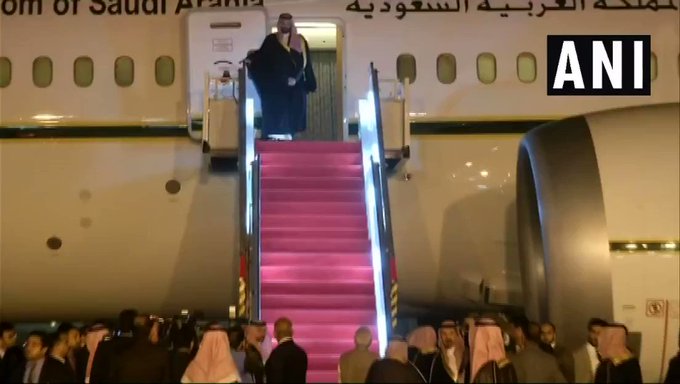
By Kuwar Singh February 21, 2019 Quartz.com India
The Saudi Arabian crown prince’s visit to India this week ended under the same cloud where it began.
Just days before Mohammed bin Salman’s visit, over 40 uniformed men were killed in the state of Jammu & Kashmir, when a suicide bomber rammed an explosive-laden SUV into a convoy of the Central Reserve Police Force (CRPF) in Pulwama district. The attack was the biggest on Indian soil in the past five years.
India pinned the blame on neighbouring rival Pakistan, hours after which the crown prince, also the Saudi deputy prime minister, arrived to spend two glitzy days in Islamabad.
In this charged atmosphere, the Indian National Congress, the country’s main opposition party, railed against prime minister Narendra Modi when he broke protocol and received bin Salman on the runway with a signature hug, only a day after the 33-year-old prince had announced $20 billion (around Rs1.4 lakh crore) worth of Saudi investment in Pakistan.


By breaking protocol and welcoming Saudi Crown Prince Mohammad Bin Salman with such abundance – only hours after he promised billions to Pakistan – PM Modi has shown the country, the martyrs and every soldier in India what he thinks of their service & sacrifice.1:52 AM – Feb 20, 2019
Some observers agreed that the hug was poorly timed, especially when the West has distanced itself from bin Salman following the murder of the Saudi dissident journalist Jamal Khashoggi in October last year, allegedly at the crown prince’s behest.
“A more subdued welcome might have played better in the public eye,” said Michael Kugelman, deputy director of the Asia Program at the Wilson Center, a think-tank based in Washington DC. “But then again, business is business. So it’s easy to understand why New Delhi would want to disregard public relations considerations and focus on the visit of a leader who has the ability to make some much-needed investments in India’s economy, particularly with regards to energy.”
The crown prince is leading the effort to diversify Saudi Arabia’s revenue sources beyond oil. As the world’s fastest-growing major economy, India presents several investment opportunities for the cash-rich kingdom, said Kabir Taneja, associate fellow at the Observer Research Foundation, a think-tank based in New Delhi.
Expecting Saudi Arabia to reprimand Pakistan for the Pulwama attack would be unreasonable, Taneja added. “The Pakistan-Saudi dynamic is existential for both of them. Saudi Arabia treats Pakistan as a place where it can go and purchase mercenaries.”
The Pakistan Army protects both Saudi Arabia’s royal family and the border with war-ravaged Yemen, and the kingdom often helps Pakistan’s struggling economy with cash and cheap oil.
While the crown prince in New Delhi did not announce a hard, flashy investment figure like the $20 billion for Pakistan, Saudi Arabia’s ongoing investment projects in India—such as the proposed $44 billion Ratnagiri oil refinery in Maharashtra—got a major boost from his visit, Taneja said.
Underlined: Saudi doublespeak
Bin Salman’s joint statement in Pakistan “underlined the need for avoiding politicisation of UN listing regime.” This weakened India’s sustained attempts to place Masood Azhar on the UN’s list of designated terrorists. Azhar is the founder of the Pakistan-based terror group Jaish-e-Mohammed (JeM) that has claimed responsibility for the Kashmir bombing.
On Thursday (Feb. 21), however, the UN Security Council “condemnedin the strongest terms” the Pulwama terror attack and even named JeM for orchestrating it.
Saudi Arabia’s joint statement with India had “underlined the importance of comprehensive sanctioning of terrorists and their organisations by the UN,” in an oblique reference to Azhar.
Whichever way the crown prince swings, “given the Saudis’ association with hardline ideologies that help fuel Islamist extremism, Riyadh may not be the best counterterrorism partner for India,” Kugelman said. “Sticking to trade and investment is likely a better move.”

 @INCIndia
@INCIndia